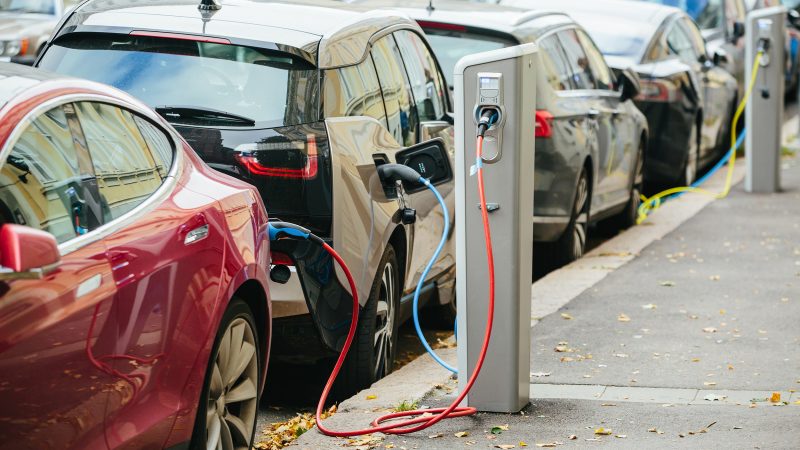
Rachel Reeves made a firm commitment to boost the UK’s automotive industry while reducing carbon emissions in her debut speech as Shadow Chancellor earlier this month. She called for the UK to become “world leaders” in electric vehicle production and committed Labour to plans for three electric vehicle battery gigafactories by the end of this parliament.
The speech echoed Ed Miliband’s call for an “electric vehicles revolution“, which also pledged interest free loans for households to buy an electric car and the acceleration of rolling out charging points across the UK. It is clear that the mass roll out of electric vehicles is at the centre of Labour’s industrial and climate strategies.
Yet, behind the promise of reviving industry and delivering jobs lies the threat of devastating impacts on communities and workers across the planet. Human rights abuses and environmental devastation are widespread throughout the supply chains for key metals and minerals needed to manufacture electric vehicle batteries, particularly at the point of extraction. In failing to even acknowledge these impacts, these plans are sharply out of step with social and climate justice, and should be opposed by anti-imperialists across the labour movement.
Cobalt and lithium are two materials essential to constructing lithium-ion batteries, the dominant renewable battery used in electric vehicles. Last year, the World Bank estimated that demand for both materials will increase 500% by 2050, largely driven by demand for electric vehicles, which would take demand beyond existing reserves.
This has caused concern amongst capitalists and politicians in the global north about access to what they term ‘critical minerals’, as they seek to minimise political disruptions to the accumulation of capital that battery and vehicle manufacturing would bring. As a recent report by War on Want and the London Mining Network outlined in great detail, a global scramble is therefore underway to secure access to new reserves and exploitation licenses.
That prospect has raised alarm bells for communities across the globe already impacted by lithium and cobalt mining. The majority of the world’s cobalt is mined in the Democratic Republic of Congo, both informally in small-scale mines and industrially by ‘western’ and Chinese mining corporations. Child labour is widespread and workers face extreme threats to their health, both because of frequent accidents resulting from unsupported tunnels collapsing and chronic exposure to dust containing cobalt, which often results in fatal lung disease.
Despite the immense value of cobalt in battery supply chains the IndustriALL Union, which represents Congolese miners, said: “Almost all this wealth disappears into foreign countries, or locally through corruption, with the complicity of foreign companies.” Indigenous communities in the Atacama desert of Chile have long been mobilising against lithium mining, which has caused artificial water scarcity by consuming 65% of the region’s water in the production process.
In 2019, an alliance of 18 local indigenous communities blockaded the roads used to transport lithium, timing their action to coincide with the nationwide rallies against inequality and neoliberalism. Maria Cariola, a researcher working for a Chilean NGO, analysed the protests over lithium as being “very much connected to the nationwide protests for greater democratisation and economic redistribution”. The blockade pointed not just to water shortages but to the fact that the local community “does not have any influence on the development of their territory”.
This question of consent runs to the heart of conflicts over mining projects across the planet. In 2018, a broad alliance of mining affected communities, trade unions and small scale farmers, amongst others, came together from 28 African countries as well as from the Americas, Asia Pacific, and Europe at the thematic social forum. They warned of a process of ‘recolonisation and the scramble to control scarce strategic resources’. Their key message was that they have “the right to say NO to extractive activities in our territories”, whilst calling for “reparations of the historical, ecological and social debt owed to the peoples of the South”.
In calling for the UK to become “world leaders” in electric vehicle battery production, with gigafactories part-financed in collaboration with the private sector, Labour is advocating a transition that benefits green capitalists in the UK overwhelmingly at the expense of Black and brown communities in the global south. The alternative is clear. Labour must push for supply chain justice by standing in solidarity with workers and communities across renewable energy supply chains. On the demand side, mineral recycling must be massively scaled up as part of a wider push towards circular production to reduce extraction.
Crucially, Labour should be calling for mass investment in free, electrified and publicly owned transport, as called for by the 2019 green new deal motion passed at party conference. Not only would this reduce material demand by lowering the number of road vehicles, but would help create the well-paid, unionised green jobs needed whilst ensuring quality transport options are accessible to all, not just those who can afford private vehicles.




More from LabourList
‘Labour must confront the crisis of first past the post before it’s too late’
Unite to debate affiliation with Labour Party at conference next year
Miliband tops LabourList Cabinet league table, with gender divide in PM approval